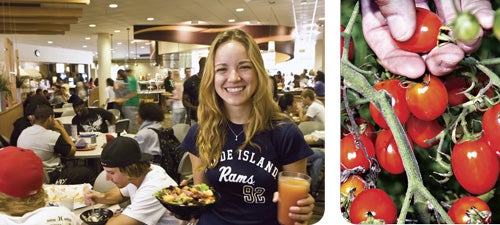Eating Green

For the fifth year in a row, Hope Commons has been recognized by the National Association of College & University Food Services for its environmentally friendly practices.
The latest sustainability effort is the sale of waste vegetable oil to Newport Biodiesel for conversion to biofuel. “We’ve recycled our oils for close to eight years, but we’ve never been sure what the vendors used it for,” said Michael McCullough, associate administrator of URI Dining Services. “Now, we hope the oil we sell to Newport Biodiesel will come full circle and end up in our gas pumps to power our vehicles.” Although the fee Newport Biodiesel pays for the oil is small, McCullough hopes that one day it will provide scholarships to students interested in alternative fuels or sustainable business operations.
URI Dining Services is also buying local. Their primary produce vendor is Rhode Island’s own Roch’s Fresh Foods. Roch’s has worked with local farmers to streamline the process of acquiring local produce. More than 30 other southern New England vendors provide most other menu items. And students are growing herbs, cherry tomatoes, and salad greens on campus for use in the dining halls.
Trays in the dining halls have long been a thing of the past, with some unexpected environmental benefits. “We’re not using soap and water or labor to clean them, and it’s saving on food costs and waste, because with trays, people tend to load up on food that often gets thrown away,” McCullough said. “Going trayless is a hot-button issue in food service. So hot, in fact, Harvard called to ask how we did it. We just took them away, and people embraced the idea immediately and never asked for them back.”
Dining Services is also eliminating polystyrene take-out containers, using recycled paper products, selecting vendors with sustainable business operations, and donating all perishable foods to the Rhode Island Community Food Bank at the end of each semester.
 Home
Home Browse
Browse Close
Close Events
Events Maps
Maps Email
Email Brightspace
Brightspace eCampus
eCampus


